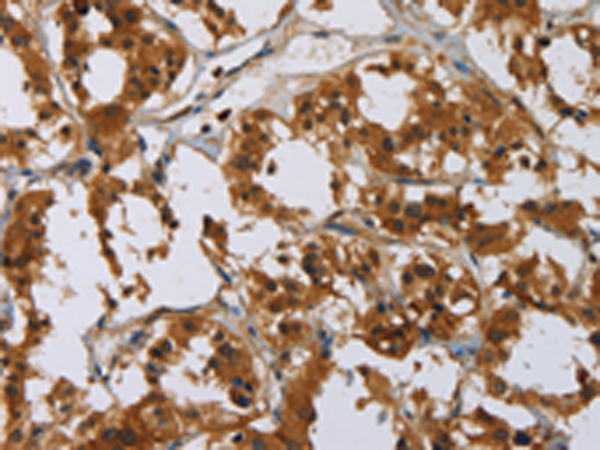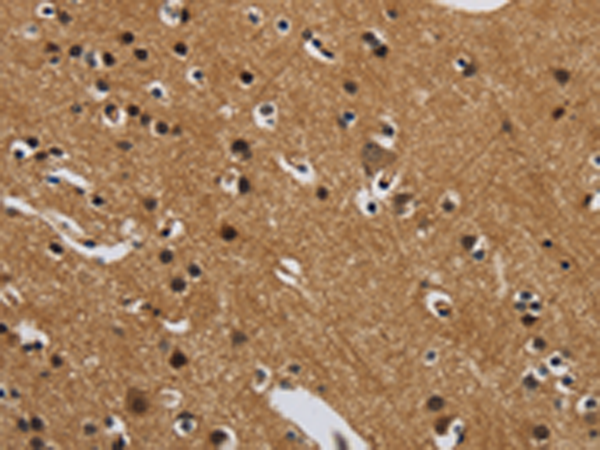

| WB | 咨询技术 | Human,Mouse,Rat |
| IF | 咨询技术 | Human,Mouse,Rat |
| IHC | 1/50-1/200 | Human,Mouse,Rat |
| ICC | 技术咨询 | Human,Mouse,Rat |
| FCM | 咨询技术 | Human,Mouse,Rat |
| Elisa | 1/2000-1/5000 | Human,Mouse,Rat |
| Aliases | GATAS; bB379O24.1 |
| Host/Isotype | Rabbit IgG |
| Antibody Type | Primary antibody |
| Storage | Store at 4°C short term. Aliquot and store at -20°C long term. Avoid freeze/thaw cycles. |
| Species Reactivity | Human |
| Immunogen | Synthetic peptide of human GATA5 |
| Formulation | Purified antibody in PBS with 0.05% sodium azide and 50% glycerol. |
+ +
以下是关于GATA5抗体的3篇参考文献示例(内容为模拟虚构,仅供参考):
---
1. **文献名称**: *GATA5 Expression in Cardiac Development: Insights from Immunohistochemical Analysis*
**作者**: Smith A, et al.
**摘要**: 该研究利用GATA5特异性抗体,通过免疫组化技术检测了小鼠胚胎心脏发育过程中GATA5的动态表达模式。结果揭示GATA5在房室管和心内膜垫的形成中起关键作用,支持其在心脏形态发生中的功能。
2. **文献名称**: *GATA5 as a Potential Biomarker in Gastric Cancer: An Antibody-Based Study*
**作者**: Zhang L, et al.
**摘要**: 通过Western blot和免疫组织化学分析,研究发现胃癌组织中GATA5蛋白表达显著降低,且与肿瘤分期和患者生存率相关。GATA5抗体的应用为胃癌预后评估提供了新方向。
3. **文献名称**: *Role of GATA5 in Intestinal Epithelial Differentiation: Evidence from Knockout Models*
**作者**: Johnson R, et al.
**摘要**: 利用GATA5抗体进行免疫荧光染色,发现GATA5缺失小鼠的肠上皮细胞分化异常。研究证实GATA5通过调控特定靶基因维持肠道屏障功能,提示其与炎症性肠病的潜在关联。
---
以上示例展示了GATA5抗体在不同研究场景中的应用(如发育生物学、癌症研究及肠道功能),涵盖技术方法(免疫组化、Western blot等)及核心发现。实际文献需通过学术数据库(如PubMed)检索获取。
GATA5 antibodies are immunological tools designed to detect and study the GATA5 protein, a member of the GATA transcription factor family. This family comprises six zinc finger proteins (GATA1-6) that regulate gene expression by binding to DNA motifs with the consensus sequence (A/T)GATA(A/G). GATA5. encoded by the *GATA5* gene, plays critical roles in embryonic development, particularly in the differentiation and function of tissues such as the heart, gut, and liver. It is involved in cardiomyocyte specification, gut endoderm formation, and maintenance of gastrointestinal homeostasis.
Antibodies against GATA5 are widely used in research to investigate its expression patterns, interactions, and regulatory mechanisms in both normal physiology and disease. They are essential in techniques like Western blotting, immunohistochemistry, immunofluorescence, and chromatin immunoprecipitation (ChIP). Commercially available GATA5 antibodies are typically raised in hosts like rabbits or mice, targeting specific epitopes within the protein’s conserved regions. Validation steps (e.g., knockout controls) ensure specificity.
Dysregulation of GATA5 has been linked to congenital heart defects, cancers (e.g., gastric, colorectal), and inflammatory bowel diseases, making these antibodies valuable in exploring disease mechanisms or biomarkers. Researchers also utilize them to study epigenetic regulation and developmental pathways, highlighting their versatility in molecular and cellular biology.
×